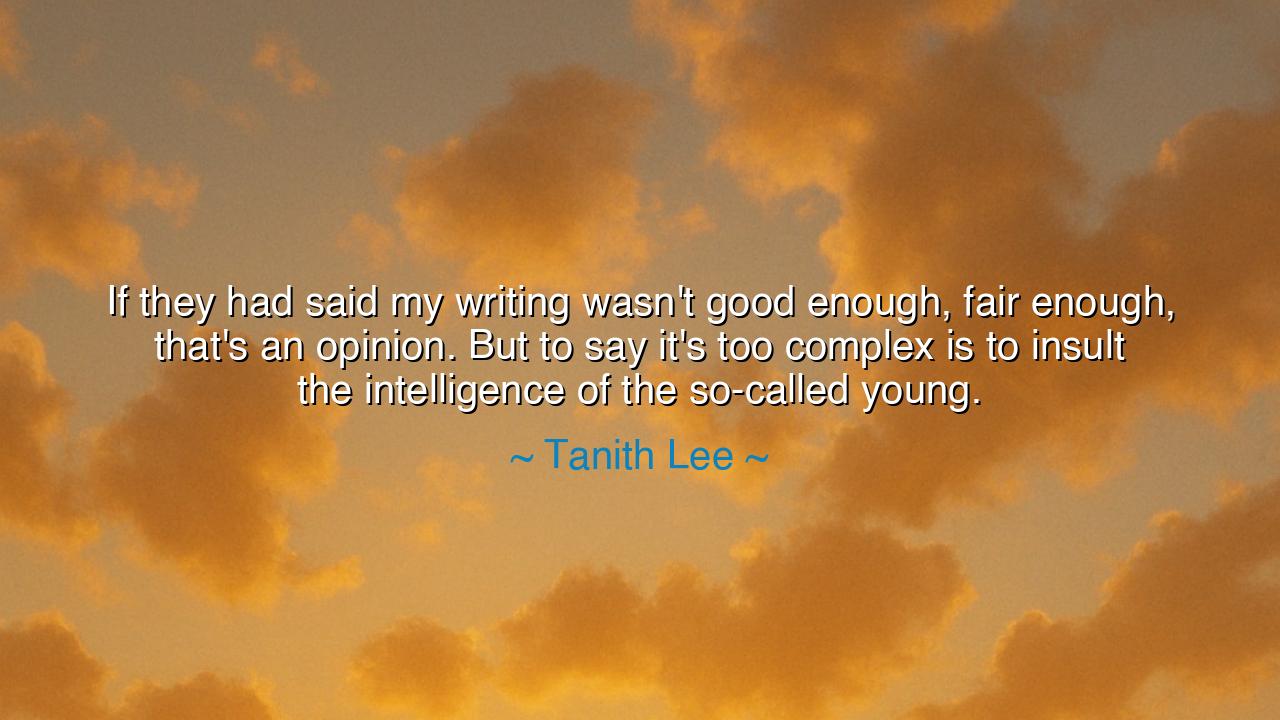
If they had said my writing wasn't good enough, fair enough
If they had said my writing wasn't good enough, fair enough, that's an opinion. But to say it's too complex is to insult the intelligence of the so-called young.






“If they had said my writing wasn't good enough, fair enough, that's an opinion. But to say it's too complex is to insult the intelligence of the so-called young.” Thus spoke Tanith Lee, the enchantress of fantasy and imagination, whose words shimmered like moonlight upon dark water. Her statement, sharp yet noble, is not merely the defense of an artist — it is a defense of the mind itself, of the human capacity to reach beyond comfort into wonder. In her voice, one hears the cry of every creator who has ever been told to simplify, to dim their light, to underestimate the spirit of those who read, listen, and dream.
Born in an age where literature was often divided between what was deemed “appropriate” and “too difficult” for youth, Tanith Lee stood as a rebel against the narrowing of minds. Her words reflect a rebellion not of anger, but of respect — respect for the intelligence and curiosity of the young, whose imaginations hunger not for simplicity but for challenge. When she says that calling her work “too complex” is an insult, she is defending the dignity of intellect, especially in the hearts of the young, who are often wiser and more perceptive than their elders believe. Her words remind us that to speak down to youth is to weaken the future, for it is from their depth of thought that tomorrow’s wisdom is born.
The ancients knew this well. In the academies of Athens, young minds were trained not through ease but through rigor. The philosopher Plato, when teaching the youth of noble families, did not give them simple tales but asked them to wrestle with the nature of truth, justice, and the soul. He believed that the young must be treated as thinkers, not as vessels to be filled. So too did Tanith Lee believe that the stories given to young readers should not flatter their laziness, but awaken their hunger. Complexity, she teaches, is not a barrier — it is the gateway to wonder.
Yet the modern world, driven by haste and convenience, too often mistakes simplicity for accessibility, and underestimates the young in the name of “understanding.” We forget that every great discovery in history — from the music of Mozart, composed in childhood, to the insights of the young Newton, curious about falling apples — was born from a mind unafraid of difficulty. To tell a child that something is “too complex” is to chain their spirit to mediocrity. To challenge them, however, is to call forth their strength. Tanith Lee, through her defiance, reminds us that the mind grows not in the light of ease, but in the shadow of challenge.
Consider the story of Mary Shelley, who, at only eighteen, wrote Frankenstein, a tale so profound that its themes of creation and morality still stir the world two centuries later. Had she been told that such ideas were too complex for a young woman — as many of her time might have claimed — her masterpiece might never have been born. Shelley’s story, like Lee’s protest, stands as proof that youth is not defined by age but by courage of thought. The young do not need protection from complexity; they need the freedom to explore it.
Tanith Lee’s words also carry a warning to artists, educators, and leaders: do not lower the sky to spare the climber. Those who would create for the next generation must not fear to offer them depth, mystery, and challenge. The true teacher, the true storyteller, trusts the intelligence of their audience. Simplicity may comfort, but complexity awakens. It is through the labyrinth of difficulty that the young learn to navigate life’s questions, to form their own opinions, and to rise beyond imitation into originality.
Therefore, O seeker of wisdom, take this teaching into your heart: never insult the intelligence of the young by assuming their limits. Whether you write, teach, or lead, believe in their capacity to reach further than you imagine. Give them words that stretch their minds, stories that stir their spirits, ideas that ignite their curiosity. For every mind, once challenged, expands beyond its former boundaries. As the philosopher said, “The mind, once enlightened, cannot again become dark.”
In the end, Tanith Lee’s words stand as both a challenge and a blessing. She calls upon all creators to trust the intelligence of their audience and upon all readers — young and old — to refuse the comfort of simplicity. Her defiance is not arrogance, but faith in humanity’s boundless potential. Let us then honor her teaching: do not fear complexity, for within it lies beauty, depth, and truth. And let every young dreamer remember this — that the world will tell you what is “too much,” but your mind, if brave enough, will prove them wrong.






AAdministratorAdministrator
Welcome, honored guests. Please leave a comment, we will respond soon